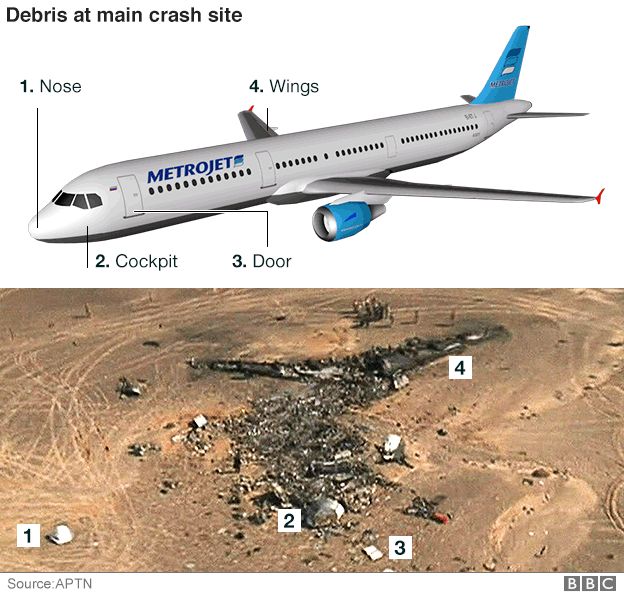Intelligence suggests the Russian plane that crashed in Egypt killing all 224 people on board may have been brought down by a bomb, US and UK officials say.
But they say they have yet to reach a formal conclusion.
Britain earlier suspended flights to and from the resort of Sharm el-Sheikh, from where the flight had departed.
Egypt has dismissed claims by militants linked to Islamic State (IS) that they brought down the plane.
Russian experts say it is too early to say.
Separately on Wednesday, Egyptian officials said the cockpit voice recorder of the Metrojet Airbus 321 was badly damaged in the crash.
However, they managed to extract information from the flight data recorder which is ready to be analysed by investigators, Egypt's Civil Aviation Minister Mohamed Hossam Kamal said.
'Significant possibility'
The plane, bound for St Petersburg, crashed in Egypt's Sinai desert just 23 minutes after take-off from Sharm el-Sheikh on Saturday.
Most of those on board the plane, which was operated by Russian airline Kogalymavia, were Russian.
"We have concluded that there is a significant possibility that the crash was caused by an explosive device on board the aircraft," UK Foreign Secretary Philip Hammond told reporters after the government's crisis response committee met late on Wednesday.
He said Britain was suspending all flights to and from Sharm el-Sheikh indefinitely and UK nationals already there would be helped to leave once extra security measures were put in place.
Earlier, Prime Minister David Cameron's office said UK aviation experts had been sent to Sharm el-Sheikh to assess the security situation there.
Egyptian Foreign Minister Sameh Shoukry called the UK response premature and unwarranted, telling the BBC that Egypt had taken "exceptional measures" to enhance security at Sharm el-Sheikh airport.
The UK government is currently hosting Egyptian President Abdul Fattah al-Sisi.
 Image copyrightAFP
Image copyrightAFPAn unnamed US official told the Associated Press news agency they had reached the "tentative conclusion", after intercepting communications, that an IS affiliate in the Sinai peninsula had planted an explosive device on the plane.
"A bomb is a highly possible scenario," another US official told the AFP news agency.
But the officials stressed that forensic evidence, including the flight recorders, was still being analysed.
On Tuesday, US media reported that a military satellite had detected a "heat flash" over the Sinai at the time of the crash.
It said data was still being analysed and that although the flash could have been caused by a bomb, a fuel tank or engine explosion was also possible.
Mr Sisi, in a BBC interview on Tuesday, dismissed as "propaganda" claims that militants linked to IS brought down the aircraft.
The militants have carried out a series of deadly attacks against Egyptian security forces in recent years.
Kogalymavia earlier this week blamed "external influence" for the crash, but the head of Russia's aviation agency said such talk was premature.

Timeline: the course of flight KGL9268
05:58 Egyptian time (03:58 GMT): Flight leaves Sharm el-Sheikh
06:14 Egyptian time (04:14 GMT): Plane fails to make scheduled contact with air traffic control based in Larnaca, Cyprus, according to an official with Russia's air transport agency
06:17 Egyptian time, approx (04:17 GMT): Plane comes down over the Sinai peninsula
11:12 Egyptian time (09:12 GMT): Flight had been due to land in St Petersburg's Pulkovo airport



